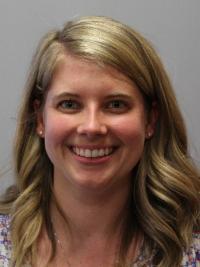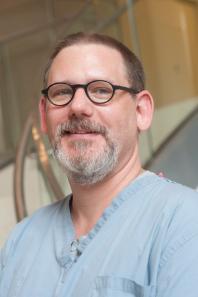PGY2 Internal Medicine Residency
The PGY2 Internal Medicine Pharmacy Residency is an American Society of Health System Pharmacists (ASHP) accredited twelve-month program within the specialized practice area of internal medicine. The program provides structured experiences in a variety of internal medicine-related areas designed to develop the knowledge, skills, leadership, and attitudes to competently participate with a contemporary interdisciplinary internal medicine team. The internal medicine resident will also participate in quality improvement projects, institutional committees, didactic lectures, and other educational activities designed to prepare the resident for a practice with adjunct faculty responsibilities.
Purpose Statement
PGY2 pharmacy residency programs build on Doctor of Pharmacy (Pharm.D.) education and PGY1 pharmacy residency programs to contribute to the development of clinical pharmacists in specialized areas of practice. PGY2 residencies provide residents with opportunities to function independently as practitioners by conceptualizing and integrating accumulated experience and knowledge and incorporating both into the provision of patient care. Residents who successfully complete an accredited PGY2 pharmacy residency are prepared for advanced patient care, academic, or other specialized positions, along with board certification, if available.
Qualifications
Applicants must be Doctor of Pharmacy graduates from an ACPE-accredited school or college of pharmacy; have completed an accredited PGY1 Pharmacy Practice Residency; be licensed or eligible for pharmacist licensure in Virginia; and possess requisite patient care training or experience. The successful applicant must possess exceptional knowledge, clinical problem-solving, communication skills, and leadership qualities.
Residency Goals
- To develop expert skills and competency in an internal medicine patient-centered practice.
- To develop teaching, assessment, and communication skills necessary to provide education to pharmacy trainees, health care professionals, and patients.
- To develop proficiency in institutional policies, systems, and internal medicine pharmacy practice.
- To provide experience with quality improvement and research.
Program Structure
The program is comprised of eight required and three elective rotations. Patient care rotations are generally five weeks in duration. The staffing/operations rotation is longitudinal over the course of the year and occurs in three critical care pharmacy satellite locations. Longitudinal projects required to meet the ASHP accreditation standards include service on an institutional committee, completion of a research project, one drug monograph, and a medication use evaluation.. Other required longitudinal components completed in conjunction with the required and elective rotations include 20 weeks of ambulatory care experience. The elective rotations are based on the resident's professional interest. Requirements for successful completion of the residency will be furnished to the resident upon interviewing for the position.
Required Rotations (8)
- Orientation
- Internal Medicine (Non-teaching)
- Hospital Medicine Service
- Internal Medicine Teaching I
- Internal Medicine Teaching II
- Internal Medicine Teaching III - Preceptor of Record
- Medical Respiratory Intensive Care Unit
- Staffing/Operations (longitudinal, every third weekend; approximately 17 weekends per year; 1 minor holiday; 1 major holiday)
Ambulatory Clinic
(Longitudinal, 20 weeks total, comprised of 2 rotations of 10 weeks, ½ day in length)
- Anticoagulation
- Adult Cardiology
- Adult Psychiatry
- Family Medicine
- HIV/Infectious Disease
- Nephrology
- Center of Advanced Health Management (geriatrics/comprehensive medicine)
Elective Rotations (3)
- Internal Medicine (Non-teaching)
- Hospital Medicine Service (Non-teaching)
- Cardiology Medicine
- Emergency Medicine
- General Surgery/Trauma Medicine
- Hematology/Oncology
- Infectious Disease Consult Service
- Neurology
- Transplant Surgery (Solid Organ – liver, kidney, or heart)
Teaching
PGY2 Internal Medicine Residents are given an academic faculty appointment as a Clinical Instructor at the Virginia Commonwealth University (VCU) School of Pharmacy and have opportunities to provide didactic instruction (e.g., lectures, team-based learning sessions, case conferences), laboratory facilitation, and experiential training (e.g., APPEs) for Doctor of Pharmacy students from the VCU School of Pharmacy. Residents may participate in an elective teaching and learning certificate program.
Research and Quality Improvement
PGY2 Internal Medicine Residents are given an academic faculty appointment as a Clinical Instructor at the Virginia Commonwealth University (VCU) School of Pharmacy and have opportunities to provide didactic instruction (e.g., lectures, team-based learning sessions, case conferences), laboratory facilitation, and experiential training (e.g., APPEs) for Doctor of Pharmacy students from the VCU School of Pharmacy. Residents may participate in an elective teaching and learning certificate program.
Program Leadership
 |
Program Director DaleMarie Vaughan, PharmD, BCPS Clinical Specialist, Internal Medicine Associate Professor of Pharmacy PharmD, Virginia Commonwealth University School of Pharmacy Residency in Pharmacy Practice, Virginia Commonwealth University Health System Residency in Internal Medicine, Virginia Commonwealth University Health System |
 |
Coordinator, Pharmacy Residency Programs |
 |
Director, Department of Pharmacy Services |
Accreditation
This program is accredited by the American Society of Health-System Pharmacists and participates in the ASHP/NMS PGY2 Matching Program and PhORCAS. For details, visit the ASHP PhORCAS website.
Recruitment
Visit our Application and Recruitment page for more information on our virtual sessions and ASHP showcase and Personal Placement Service participation.
Number of Positions
2
Salary and Benefits
The salary for PGY2 pharmacy residents at VCU Health System is $60,000.
Duration of Appointment
The pharmacy resident's contract at VCU Health System will begin on July 1 of the program year. The pharmacy residency will be completed on June 30 of the subsequent year.
Leave and Benefits
Two weeks (10 days) of paid vacation or personal leave are granted. Additionally, 9 days of paid holiday leave and 5 days of paid sick leave are provided. Residents also receive 2 days of family/self-care leave and 10 days for educational or professional leave.
Health Benefits
The VCU Health System provides a health insurance policy, including outpatient physician visits, lab tests, and optional dental, vision, and family coverage.
Liability Insurance
VCU Health System provides professional liability (malpractice) insurance for each pharmacy resident. The policy covers professional service within the institution.
Moonlighting
Residents may pursue additional paid staffing within VCU Health System upon program director approval, not exceeding 16 hours weekly.
Office Space and Resources
Office space and remote access to patient and drug information are provided for residents.
Health and Recreation Facilities
Residents have access to VCU recreational facilities at a reduced membership fee.
Parking
Parking and health-system shuttles are available on the VCU Medical Center campus at no cost.